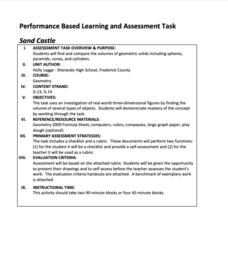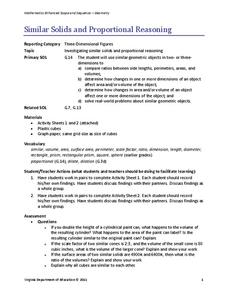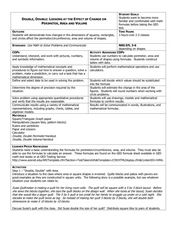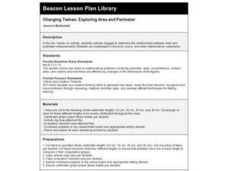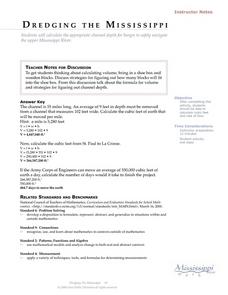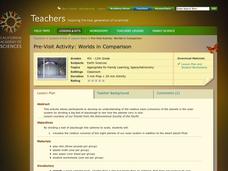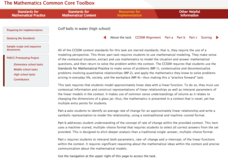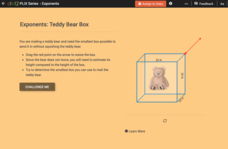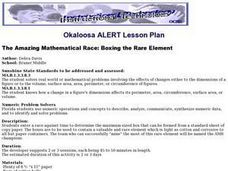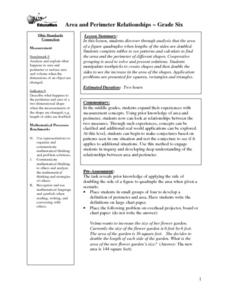Radford University
Sand Castle
Don't let the task slip through your fingers like sand. Scholars design sand castles using hemispheres, pyramids, cones, and cylinders of different sizes. They calculate the volume and surface area and consider how changing the...
Curated OER
Two for One Box Company
Students draw a net (a two-dimensional pattern that can be formed to make a solid) for making an open top box on grid paper. They cut out the net and fold up each side to form the open box and tape the sides, then find the volume of the...
Virginia Department of Education
Similar Solids and Proportional Reasoning
Double the dimensions, quadruple the surface area. Pairs build similar prisms and compare the ratios of their surface areas and volumes to the ratio of the heights. Given two similar cones, partners determine the ratios of the lateral...
Curated OER
The Same but Different Part II
Third graders experiment with beakers of water and balloons to measure the volume of the gas in the balloon. They determine ways to change the volume of air in the balloon which changes its size but not its physical state. By heating the...
Curated OER
Collecting the Rays
Students investigate the affect shape has on the ability of a solar panel to collect sunlight. In this collecting sunlight using a solar panel lesson, students determine which solar panel shape collects the most sunlight. Students use...
Curated OER
Double, Double: Looking at the Effect of Change on Perimeter, Area and Volume
Students explore perimeter, volume, and area. In this math lesson, students explore how changes in dimensions of geometric shapes affect the perimeter, area and volume of the various shapes. Students investigate the results when the...
Columbus City Schools
What’s Up with Matter?
Take a "conservative" approach to planning your next unit on mass and matter! What better way to answer "But where did the gas go?" than with a lab designed to promote good report writing, research skills, and detailed observation. The...
Texas Instruments
Cylindrical Soda Can
Young scholars explore an application of differentiation in this calculus lesson. They investigate the ideal dimensions for a soda can and, using the symbolic capacity of the Ti-89, investigate the dimensions of the can which has the...
Curated OER
Cylinder: Student Worksheet
Pairs of geometry whizzes work together to determine which of three differently shaped cylinders will have the greatest volume. Pupils cut out the three rectangles embedded in the plan, and tape them together to form a cylinder. From...
Noyce Foundation
Which is Bigger?
To take the longest path, go around—or was that go over? Class members measure scale drawings of a cylindrical vase to find the height and diameter. They calculate the actual height and circumference and determine which is larger.
Curated OER
Changing Twines: Exploring Area and Perimeter
Third graders review formulas for area and perimeter in quadrilaterals. They arrange pre-cut twine on a centimeter graph paper to create non-congruent quadrilaterals. They calculate the perimeter and area of each form.
Mr. Hill's Science Website
Density Workbook
It's all about density! Here's a dense workbook for young scientists; they solve (and show work for) 29 density word problems, including a problem where they solve for the density of Godzilla. They complete labs analyzing metal cubes,...
Curated OER
Water Locked
Young scholars calculate cubic feet of water and rate of flow, given the formulas for volume, rate of flow and specific dimensions. Students use symbolic forms to represent and analyze mathematical situations and structures. Young...
Curated OER
Dredging the Mississippi
Students determine the amount of earth that needs to be removed from the Mississippi and the amount of time it takes the Army Corps of Engineers to complete a dredging project. Given specific dimensions of a channel, calculations are...
Curated OER
Cylinder: Teacher Notes
Middle schoolers construct a basic cylinder out of a piece of paper, then answer seven questions about their cylinder. Questions have to do with measurement, volume, radius, etc.
Curated OER
Linear, Square, and Cubic Units
Linear, square, and cubic units are all investigated as different types of packages are measured. The teacher will need supplies such as a box of aluminum foil, a package of ribbon, and a bag of mulch. The class determines the...
Pacific Science Center
Worlds in Comparison
Young astronomers follow a step-by-step procedure for dividing a lump of dough into parts, resulting in a scaled volume set of puny planets. Along with the printable directions is a template chart of planet names on which learners can...
Willow Tree
Measurement
Build a basic understanding of units of measure and create a great foundation for your learners. The instructional activity gives a complete overview of everything measurement, from types of measurement to rounding to conversions — it...
Mathematics Common Core Toolbox
Golf Balls in Water
Here's a resource that models rising water levels with a linear function. The task contains three parts about the level of water in a cylinder in relationship to the number of golf balls placed in it. Class members analyze the data and...
CK-12 Foundation
Whole Number Exponents: Teddy Bear Box
Five questions—multiple-choice, fill in the blank, and discussion—make up an interactive that challenges scholars to mail a teddy bear using the smallest box possible without squishing it. A box with movable sides allows mathematicians...
Curated OER
The Amazing Mathematical Race: Boxing the Rare Element
Students enter a race against time to determine the maximum sized box that can be formed from a standard sheet of copy paper. The boxes are to be used to contain a valuable and rare element which is light as cotton and corrosive to all...
Curated OER
Create your own thermometer
Students participate in an activity where they build a calibrated thermometer. In this thermometer lesson students complete this activity and take notes.
Curated OER
Bubbles Everywhere!
Eighth graders use concrete and graphic models to derive formulas for finding perimeter, area, surface area, circumference, and volume of two- and three-dimensional shapes. This lesson is a fun way to practice measurement and circle and...
Curated OER
Area and Perimeter Relationships
Sixth graders explore the relationship between area and perimeter. After discovering the definition of perimeter, 6th graders work together to create designs for a flower bed. They observe that the perimeter remains constant even...


